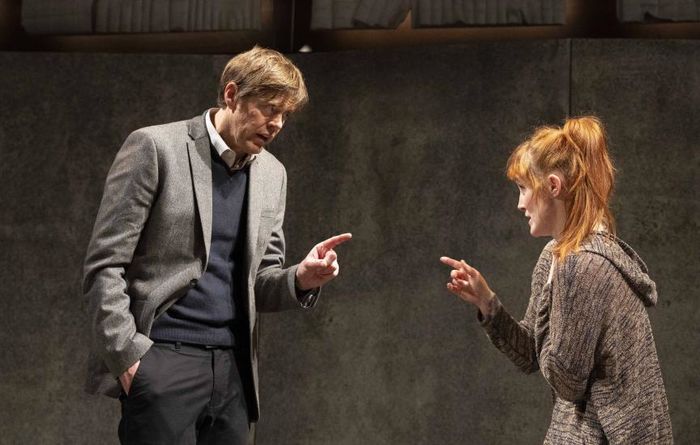Mrs Warren’s Profession still challenges a 21st century audience
Caroline Quentin as Mrs Warren breathes new life into Bernard Shaw’s provocative 1893 work

George Bernard Shaw’s 1893 play Mrs Warren’s Profession has the potential to ignite fiery debate to this day. Written just 25 years after the establishment of Girton as Cambridge’s first women’s college, the play centres on Mrs Warren’s daughter Vivian (a recent graduate of Newnham, the second women’s college) as she gets to know her mother for the first time in her life. The play charts her reaction to the revelation that Mrs Warren’s fortune — to which Vivian owes her education and her independence — was earnt from sex work.
Caroline Quentin is spectacular in the titular role, putting on the appropriate airs of a woman of great wealth, a mask which she deftly lets slip at moments to allow a boisterous, hardy character with a cockney accent to punch through. She commands the stage, delivering both emotional depths and wonderful laughs.
“Caroline Quentin commands the stage, delivering both emotional depths and wonderful laughs”
The ‘businesswoman’ gains the sympathy of both the audience and her daughter when she explains that sex work had been the only route out of poverty for her and her sister. Yet a more contentious moral question is posed in the second act, when it transpires that Mrs Warren still works in the same industry, now as the owner of several brothels.
The mother-daughter scenes are the emotional height of an all-round impressive production, and Caroline Quentin rises to the occasion. Rose Quentin’s performance as Vivian, however, was much stiffer — casting real-life mother and daughter may have been a mistake here, as the former’s talent served only to highlight the inadequacies of the latter. Rose Quentin’s portrayal did have some merit however, especially when she fell into the rhythm of a scene with her mother or her ‘little boy’ Frank (Peter Losasso).
“Peter Losasso stole the show, charming the audience with his cheek in the role of Frank”
The play is rounded out by male characters who highlight the comparative choice and freedom held by men at the turn of the century, working in art, business, the church or not at all, as in the case of Frank, the vicar’s son with a gambling habit and designs on taking Vivian’s hand in marriage.
Though Bernard Shaw’s work is a biting satire, with many comedic moments, Stephen Rahman-Hughes was a little too cartoonish as Praed, lending a very odd buoyancy to a background role with a much less convincing accent than the rest of the cast. The other male characters were very well played; Matthew Cottle as Reverend Sam Gardner and Peter Losasso as Frank Gardner were a particularly well-cast father and son duo, bringing plenty of levity to the play. Simon Shepherd was convincing as Sir George Crofts as well, but as far as the men in Mrs Warren’s Profession were concerned, Peter Losasso stole the show, charming the audience with his cheek in the role of Frank.
Sir George Crofts is at the crux of the moral quandary posed by Mrs Warren’s continued involvement in the profession, since as her business partner he profits from prostitution without “dirtying his hands” with the work. Bernard Shaw’s play was censored for thirty years for discussing, however euphemistically, the industry he described as the result of “underpaying, undervaluing and overworking women”.
Today, we may allow women considerably more independence than in Bernard Shaw’s time, but attitudes towards sex work remain divided. Looking back at Mrs Warren’s Profession from 2023, we can see even that most progressive scenes are laden with shame about the oldest profession in the world — but this doesn’t take away from its relevance as a ground-breaking exploration of the limits imposed by society’s treatment of class and gender.
Mrs Warren’s Profession is showing at the Cambridge Arts Theatre 4th to 8th April at 7.30pm
 News / Cambridge student numbers fall amid nationwide decline14 April 2025
News / Cambridge student numbers fall amid nationwide decline14 April 2025 Lifestyle / First year, take two: returning after intermission14 April 2025
Lifestyle / First year, take two: returning after intermission14 April 2025 News / First candidate to announce chancellorship bid pledges to tackle bullying 12 April 2025
News / First candidate to announce chancellorship bid pledges to tackle bullying 12 April 2025 News / Uni to ‘review’ tripos rankings and weekend lectures in undergrad teaching overhaul10 April 2025
News / Uni to ‘review’ tripos rankings and weekend lectures in undergrad teaching overhaul10 April 2025 News / PETA urges Cambridge dictionary to change ‘derogatory’ rat definition11 April 2025
News / PETA urges Cambridge dictionary to change ‘derogatory’ rat definition11 April 2025






